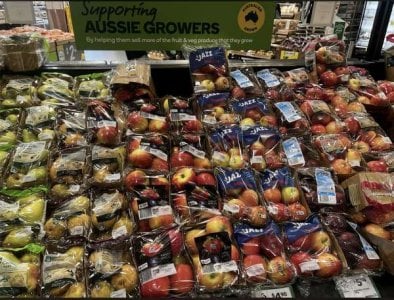‘What’s the point?’: Man slams Woolworths over excessive use of this item in stores
By
Seia Ibanez
- Replies 11
As we stroll through the aisles of our local supermarkets, we're often confronted with a sea of plastic. It's wrapped around our fruits, our vegetables, and almost every other product we lay our eyes on.
The convenience of pre-packaged goods is undeniable, but at what cost to our environment and conscience?
An outcry from a shopper has brought this issue into the spotlight, highlighting Woolworths' excessive use of single-use plastics at their Preston store.
The shopper's shared photo, depicting rows of fruit encased in plastic, sparked a wave of concern and frustration.
Accompanying the image was a poignant message: 'Genuinely made me feel like they are actively trying to make Australia a living h**l.'
‘What’s the point of banning a plastic bag at checkout when literally every item you buy is covered by plastic?’

This sentiment echoes the thoughts of many Australians who are increasingly aware of the environmental impact of plastic waste.
The shopper pointed out that loose produce was less visible and accessible, suggesting a push towards the more wasteful pre-packaged options.
In response to the backlash, a Woolworths spokesperson has defended their packaging choices, stating, ‘The majority of our fruit and veg is sold loose, and we’re working to reduce unnecessary packaging across our range where we can.’
‘We’re growing greener, but we know there’s more to be done, and we look forward to sharing our progress with customers in the years ahead.’
Dr Deborah Lau from CSIRO, an expert on ending plastic waste, acknowledged that plastic may play a role in food preservation.
However, she also emphasised that the waste generated and its disposal are critical issues. In Australia, most soft plastic ends up in landfills, as it requires specific waste collection streams for recycling.
Dr Lau suggested that ‘compostable plastics could be considered as an alternative’. However, these also come with challenges.
‘The plastic wrapping that’s pictured around the fruit containers is soft plastic,’ she said.
‘In Australia, the vast majority of soft plastic ends up in landfill.’
‘There are a number of pilot schemes and trials currently underway with the aim to grow our ability to capture this waste stream and turn it into a resource,’ Lau said.
‘Compostable plastics need to be captured separately and directed into either home or industrial composting facilities, depending on their type.’
‘Net bags for loose produce will typically end up in landfill as they are currently unable to be captured for recycling.’
However, while these alternatives are imperfect, they are still a step forward.
‘Avoiding the use of problematic and unnecessary single-use plastic is the most effective way to reduce (Woolworths’) environmental footprint,’ she added.
This comes after states banned plastics in South Australia, which aims to phase out single-use plastics by the following year.
This move is not only about reducing pollution but also about cutting carbon emissions and safeguarding marine life from the detrimental effects of plastic waste. You can read more about the story here.
 Have you found effective ways to minimise your use of single-use plastics? What alternatives would you like to see in your local supermarket? Share them with us in the comments below!
Have you found effective ways to minimise your use of single-use plastics? What alternatives would you like to see in your local supermarket? Share them with us in the comments below!
The convenience of pre-packaged goods is undeniable, but at what cost to our environment and conscience?
An outcry from a shopper has brought this issue into the spotlight, highlighting Woolworths' excessive use of single-use plastics at their Preston store.
The shopper's shared photo, depicting rows of fruit encased in plastic, sparked a wave of concern and frustration.
Accompanying the image was a poignant message: 'Genuinely made me feel like they are actively trying to make Australia a living h**l.'
‘What’s the point of banning a plastic bag at checkout when literally every item you buy is covered by plastic?’

A man criticised Woolworths for its excessive use of single-use plastics in one store. Credit: u/kungheiphatboi / Reddit
This sentiment echoes the thoughts of many Australians who are increasingly aware of the environmental impact of plastic waste.
The shopper pointed out that loose produce was less visible and accessible, suggesting a push towards the more wasteful pre-packaged options.
In response to the backlash, a Woolworths spokesperson has defended their packaging choices, stating, ‘The majority of our fruit and veg is sold loose, and we’re working to reduce unnecessary packaging across our range where we can.’
‘We’re growing greener, but we know there’s more to be done, and we look forward to sharing our progress with customers in the years ahead.’
Dr Deborah Lau from CSIRO, an expert on ending plastic waste, acknowledged that plastic may play a role in food preservation.
However, she also emphasised that the waste generated and its disposal are critical issues. In Australia, most soft plastic ends up in landfills, as it requires specific waste collection streams for recycling.
Dr Lau suggested that ‘compostable plastics could be considered as an alternative’. However, these also come with challenges.
‘The plastic wrapping that’s pictured around the fruit containers is soft plastic,’ she said.
‘In Australia, the vast majority of soft plastic ends up in landfill.’
‘There are a number of pilot schemes and trials currently underway with the aim to grow our ability to capture this waste stream and turn it into a resource,’ Lau said.
‘Compostable plastics need to be captured separately and directed into either home or industrial composting facilities, depending on their type.’
‘Net bags for loose produce will typically end up in landfill as they are currently unable to be captured for recycling.’
However, while these alternatives are imperfect, they are still a step forward.
‘Avoiding the use of problematic and unnecessary single-use plastic is the most effective way to reduce (Woolworths’) environmental footprint,’ she added.
This comes after states banned plastics in South Australia, which aims to phase out single-use plastics by the following year.
This move is not only about reducing pollution but also about cutting carbon emissions and safeguarding marine life from the detrimental effects of plastic waste. You can read more about the story here.
Key Takeaways
- A man has criticised Woolworths for excessive use of single-use plastics on produce at a Preston store.
- Woolworths defends its packaging practices, stating they are working to reduce unnecessary packaging and offer both loose and pre-packaged produce options.
- CSIRO's lead for ending plastic waste, Dr Deborah Lau, suggests that while alternatives like compostable plastics exist, they require specific waste collection streams to avoid ending up in landfills.
- Despite imperfect solutions, Lau emphasises that reducing the use of problematic and unnecessary single-use plastics is the most effective way for Woolworths to decrease its environmental footprint.







